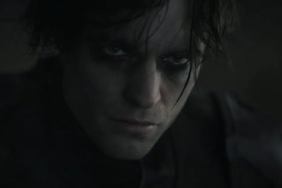In its May issue, Playboy Magazine features an interview with Grant Morrison, current writer of Batman Incorporated and Action Comics, about his career in the comics world as one of its articles you’ll claim to read. While you can see scantily clad women elsewhere on Crave Online, too, this particular channel would rather take note of one of DC’s most influential creators spouting off about the characters for whom he’s charting courses for the future. You can read the whole piece in the link above, including his likening of the Joker to David Bowie, but here are some interesting excerpts from one of the most controversial writers out there – some love him, some hate him.
On Wonder Woman:
“William Moulton Marston, the guy who created Wonder Woman, was a noted psychiatrist. He’s the guy who invented the polygraph, the lie detector. He was one of those bohemian free-love guys; he and his wife, Elizabeth, shared a lover, Olive, who was the physical model for Wonder Woman. What he and Elizabeth did was to consider an Amazonian society of women that had been cut off from men for 3,000 years. That developed along the lines of Marston’s most fevered fantasies into a lesbian utopia. Although they’re supposedly a peace-loving culture, all these supergirls’ pursuits seem to revolve around fighting one another, and this mad, ritualistic stuff where girls dress as stags and get chased and tied up and eaten symbolically on a banquet table. The whole thing was lush with bondage and slavery. Wonder Woman was constantly being tied up or shackled—and it was hugely successful. When Marston died in 1947, they got rid of the pervy elements, and instantly sales plummeted. Wonder Woman should be the most sexually attractive, intelligent, potent woman you can imagine. Instead she became this weird cross between the Virgin Mary and Mary Tyler Moore that didn’t even appeal to girls.”
On Superman:
“When Superman was created during the Great Depression, he was the champion of the oppressed and fought on the side of the working man. He was lawless. If you were a wife beater, he’d throw you out the window. If you were a corrupt congressman, he’d swing you from the rooftops until you confessed. I think it appealed to people who were losing their jobs to machines: Suddenly you had Superman wrecking machines and punching robots. But his popularity has declined—nobody wants to be the son of a farmer now. American writers often say they find it difficult to write Superman. They say he’s too powerful; you can’t give him problems. But Superman is a metaphor. For me, Superman has the same problems we do, but on a Paul Bunyan scale. If Superman walks the dog, he walks it around the asteroid belt because it can fly in space. When Superman’s relatives visit, they come from the 31st century and bring some hellish monster conqueror from the future. But it’s still a story about your relatives visiting.”
On Batman:
“He’s a rich man who beats up poor people. It’s quite a bizarre mission to go out at night dressed as a bat and punch the hell out of junkies. And then he goes home and lives in this mansion. There’s an aspirational quality to him—he’s an outlaw and he can buy anything. He has a new Batmobile every movie. He’s very plutonian in the sense that he’s wealthy and also in the sense that he’s sexually deviant. Gayness is built into Batman. I’m not using gay in the pejorative sense, but Batman is very, very gay. There’s just no denying it. Obviously as a fictional character he’s intended to be heterosexual, but the basis of the whole concept is utterly gay. I think that’s why people like it. All these women fancy him and they all wear fetish clothes and jump around rooftops to get to him. He doesn’t care—he’s more interested in hanging out with the old guy and the kid.”
Morrison even addressed his rocky past with the X-Men and, more specifically, Magneto:
“Magneto’s an old terrorist bastard. I got into trouble—the X-Men fans hated me because I made him into a stupid old drug-addicted idiot. He had started out as this sneering, grim terrorist character, so I thought, Well, that’s who he really is. [Writer] Chris Claremont had done a lot of good work over the years to redeem the character: He made him a survivor of the death camps and this noble antihero. And I went in and shat on all of it. It was right after 9/11, and I said there’s nothing fucking noble about this at all.”
So what do you think, fanboys and fangirls? Do you still love him or still hate him? Do you agree with these takes on such iconic characters?







